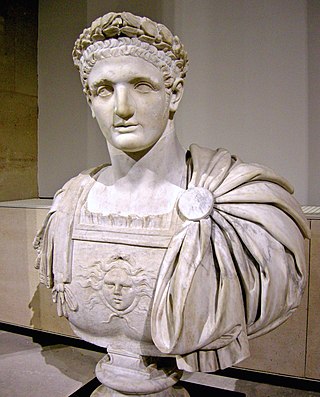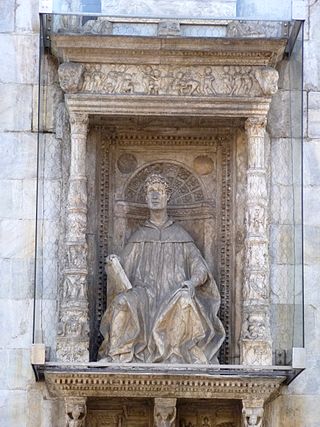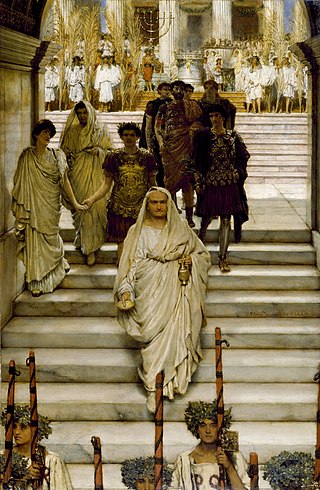Related Research Articles

Vespasian was a Roman emperor who reigned from AD 69 to 79. The fourth and last emperor who reigned in the Year of the Four Emperors, he founded the Flavian dynasty that ruled the Empire for 27 years. His fiscal reforms and consolidation of the empire generated political stability and a vast Roman building program.

The 90s was a decade that ran from January 1, AD 90, to December 31, AD 99.
AD 93 (XCIII) was a common year starting on Tuesday of the Julian calendar. At the time, it was known as the Year of the Consulship of Pompeius and Priscinus. The denomination AD 93 for this year has been used since the early medieval period, when the Anno Domini calendar era became the prevalent method in Europe for naming years.

Gaius Plinius Caecilius Secundus, born Gaius Caecilius or Gaius Caecilius Cilo, better known as Pliny the Younger, was a lawyer, author, and magistrate of Ancient Rome. Pliny's uncle, Pliny the Elder, helped raise and educate him.

Publius Clodius Thrasea Paetus, Roman senator, who lived in the 1st century AD. Notable for his principled opposition to the emperor Nero and his interest in Stoicism, he was the husband of Arria, who was the daughter of A. Caecina Paetus and the elder Arria, father-in-law of Helvidius Priscus, and a friend and relative by marriage of the poet Persius. Thrasea was the most prominent member of the political faction known today as the Stoic Opposition.
The gens Baebia was a plebeian family at ancient Rome. The first member of the gens who obtained the consulship was Gnaeus Baebius Tamphilus, in 182 BC. During the later Republic, the Baebii were frequently connected with the patrician family of the Aemilii.
Helvidius Priscus, Stoic philosopher and statesman, lived during the reigns of Nero, Galba, Otho, Vitellius and Vespasian.
When Vespasian sent for Helvidius Priscus and commanded him not to go into the senate, he replied, "It is in your power not to allow me to be a member of the senate, but so long as I am, I must go in." "Well, go in then," says the emperor, "but say nothing." "Do not ask my opinion, and I will be silent." "But I must ask your opinion." "And I must say what I think right." "But if you do, I shall put you to death." "When then did I tell you that I am immortal? You will do your part, and I will do mine: it is your part to kill; it is mine to die, but not in fear: yours to banish me; mine to depart without sorrow." Epictetus, Discourses, 1.2.19–21

The Flavian dynasty ruled the Roman Empire between AD 69 and 96, encompassing the reigns of Vespasian (69–79), and his two sons Titus (79–81) and Domitian (81–96). The Flavians rose to power during the civil war of 69, known as the Year of the Four Emperors. After Galba and Otho died in quick succession, Vitellius became emperor in mid 69. His claim to the throne was quickly challenged by legions stationed in the Eastern provinces, who declared their commander Vespasian emperor in his place. The Second Battle of Bedriacum tilted the balance decisively in favour of the Flavian forces, who entered Rome on 20 December. The following day, the Roman Senate officially declared Vespasian emperor of the Roman Empire, thus commencing the Flavian dynasty. Although the dynasty proved to be short-lived, several significant historic, economic and military events took place during their reign.
Aulus Didius Gallus Fabricius Veiento was a Roman senator who played a major role in the courts of several Roman emperors during the first century AD. For his usefulness, Veiento was rewarded with the office of suffect consul three times in a period when three consulates were very rare for non-members of the Imperial family.
Titus Avidius Quietus was a Roman senator active during the reigns of the emperors Domitian, Nerva and Trajan. The offices he held included suffect consul in AD 93 and governor of Roman Britain around 98.
Quintus Junius Arulenus Rusticus was a Roman Senator and a friend and follower of Thrasea Paetus, and like him an ardent admirer of Stoic philosophy. Arulenus Rusticus attained a suffect consulship in the nundinium of September to December 92 with Gaius Julius Silanus as his colleague. He was one of a group of Stoics who opposed the perceived tyranny and autocratic tendencies of certain emperors, known today as the Stoic Opposition.
The gens Caecinia was a plebeian family of Etruscan origin at ancient Rome. Members of this gens are first mentioned in the time of Cicero, and they remained prominent through the first century of the Empire, before fading into obscurity in the time of the Flavian emperors. A family of this name rose to prominence once more at the beginning of the fifth century.

The gens Maria was a plebeian family of Rome. Its most celebrated member was Gaius Marius, one of the greatest generals of antiquity, and seven times consul.
The gens Helvidia was a plebeian family at Rome. Members of this gens are first mentioned in the final decades of the Republic. A century later, the Helvidii distinguished themselves by what has been called their "earnest, but fruitless, patriotism."

The gens Herennia was a plebeian family at ancient Rome. Members of this gens are first mentioned among the Italian nobility during the Samnite Wars, and they appear in the Roman consular list beginning in 93 BC. In Imperial times they held a number of provincial offices and military commands. The empress Herennia Etruscilla was a descendant of this gens.
The gens Mettia, also written Metia, was a plebeian family at ancient Rome. Few members of this gens occur in history, and none attained the higher offices of the Roman state under the Republic. Several Mettii rose to prominence in imperial times, with at least three obtaining the consulship in the late first and early second century.
Quintus Baebius Macer was a Roman senator active during the second half of the first century and the first half of the second century AD. He was suffect consul for the nundinium April to June 103 as the colleague of Publius Metilius Nepos, and Urban prefect of Rome. He was also a patron of the poet Martial and an acquaintance of Pliny the Younger. He was the recipient of a letter from Pliny where the writings of Pliny the Elder are listed, apparently in response to Macer's inquiry.

The Stoic Opposition is the name given to a group of Stoic philosophers who actively opposed the autocratic rule of certain emperors in the 1st-century, particularly Nero and Domitian. Most prominent among them was Thrasea Paetus, an influential Roman senator executed by Nero. They were held in high regard by the later Stoics Epictetus and Marcus Aurelius. Thrasea, Rubellius Plautus and Barea Soranus were reputedly students of the famous Stoic teacher Musonius Rufus and as all three were executed by Nero they became known collectively as the Stoic martyrs.
Marcus Aquilius Regulus was a Roman senator, and notorious delator or informer who was active during the reigns of Nero and Domitian. Regulus is one of the best known examples of this occupation, in the words of Steven Rutledge, due to "the vivid portrait we have of his life and career in Pliny, Tacitus, and Martial." Despite this negative reputation, Regulus was considered one of the three finest orators of Roman times. Rutledge points to the judgment of Martianus Capella, who ranked him with Pliny the Younger and Fronto as the greatest Roman orators after Cicero. However, none of his speeches have survived from ancient times.
Baebius Massa, was a governor of Hispania Baetica in 92. He was an equestrian procurator of Africa in 70 and was promoted to the Senate by Vespasian as a reward for his part in the suppression of a revolt.
References
- ↑ Gunnar Haaland, "Josephus and the Philosophers of Rome: Does Contra Apionem Mirror Domitian's Crushing of the 'Stoic Opposition'?" in Josephus and Jewish History in Flavian Rome and Beyond (Brill, 2005), p. 298; B. Walker, The Annals of Tacitus: A Study in the Writing of History (University of Manchester Press, 1952, reprinted 1968), p. 199.
- ↑ Tacitus, Agricola 2.1; Pliny, Epistulae 3.11.3; Michael B. Trapp, Philosophy in the Roman Empire: Ethics, Politics and Society (Ashgate, 2007), p. 228 online.
- ↑ Haaland, Josephus and the Philosophers of Rome, p. 305.
- ↑ Pliny, Epistulae 7.33.
- ↑ Haaland, Josephus and the Philosophers of Rome, p. 305; Steven H. Rutledge, Imperial Inquisitions: Prosecutors and Informants from Tiberius to Domitian (Routledge, 2001), pp. 130–132.